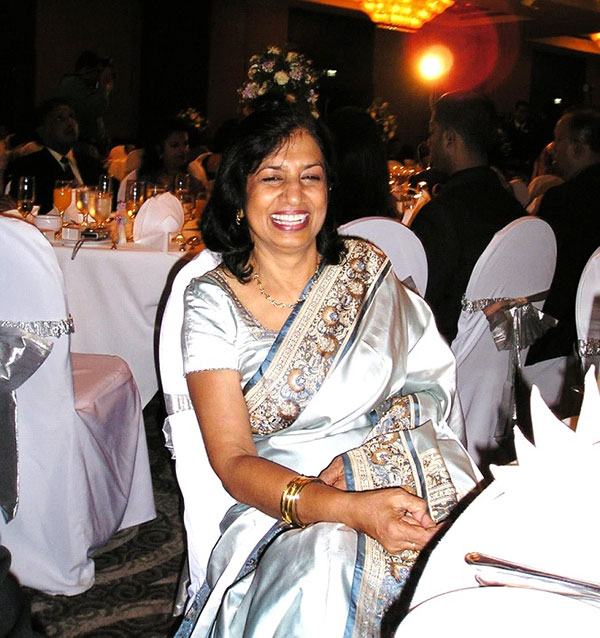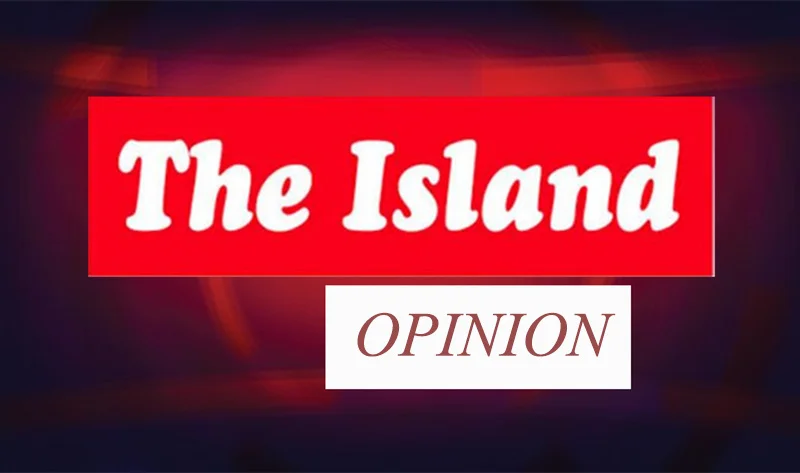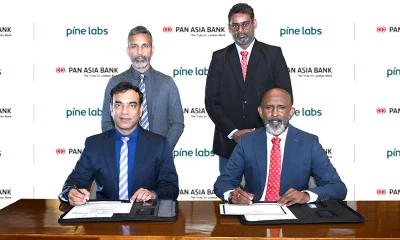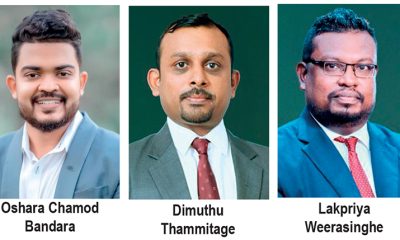Opinion
Dr. Mrs Malwattage Josephine Sarojini Perera

An embodiment of elegance, dedication, compassion and love
A tribute
It is just three years on the 6th of December 2022, since you left this mortal world and were taken by a posse of God’s angels to your heavenly abode. That occurrence submerged all of us, in your immediate and extended family, as well as all your friends and your patients, in the intolerable gloom left by a dazzling light being extinguished forever. Even in death, you had that radiant smile that you were renowned for, the one which warmed the cockles of all our hearts, day in and day out.
The lady was always like the lovely moon that brings light to the darkest night. Indeed, for all of us her loved ones, she was like no other woman that you are ever likely to meet. In her life on planet earth, she had the temperament of a celestial being, together with the marvellous spirit of a very gentle and gorgeous member of humanity. She was also the absolute embodiment of what it was like to be a lady of uninhibited grandeur. To have and to hold a woman like that, one had to be tremendously lucky; in return, one simply had to try ever so hard to treat her like the precious treasure she was.
Her heart was as soft as the wings of a butterfly and it beat ever so serenely in a way in which she would try her best to give even the world to her loved ones. She has occasionally been through moments gloomier than midnight but she always, and ever so quickly too, came out of them, to end up that much stronger, richer in spirit, and even more resilient than ever before. Her only weakness was that she cared so much for others. In everything she did, she hardly ever, if not never, put herself first. One of the kindest of souls that walked the earth, she was ever ready to forgive even some lapses on the part of those around her and the people she loved.
In her chosen vocation in healthcare, in a career spanning 45 years, which involved operative surgery, paediatrics, out-patient stints, blood bank work, rheumatology, sexually transmitted diseases, and finally working with those afflicted and affected by HIV/AIDS, she was just like a beacon of hope and succour to a flock of suffering mankind, who had the good fortune to come under her empathetic radar. Sitting and watching her dealing with a woman who had caught HIV through no fault on the part of the patient, was an abject lesson in medical professionalism. Sarojini did her very best for her patients, even more than anybody could ever have asked for. She would go even further than that legendary extra mile for them, as much as she did for those who needed her attention and care, and for those whom she loved in this world. I consider myself to have been ever so fortunate to have been one on whom her love was showered; in abundance at that.
The Good Lord above, in his perpetual wisdom, had elected to spare her the ravages of the COVID-19 pandemic and the current economic crisis by taking her into his bosom in 2019. Yet for all that, if she was with us, she most certainly would have been in her element and would have taken all those problems in her stride. She would have given her all to those suffering in the pandemic and the economic crisis. That would have been her response; one that anyone could have counted on, and one which would have been implemented with no strings attached.
I knew her for over half a century, from the time she entered the Faculty of Medicine, Colombo in my immediate junior batch and for 44 years 7 months and 11 days I had been tied to her with the golden thread of wedlock. Those were most definitely the happiest days of my existence. The rewards were unbelievable. She was the absolute epitome of a model wife and a splendid mother.
We do uncontrollably grieve at our loss, day in and day out. Our tears of desolation see no bounds whatsoever. However, we also try ever so hard, to take solace in the immortal words of Her Majesty, the late Queen Elizabeth the second “Grief is the price we pay for love.” In Sarojini, even in our worst hours of despair, we remember the sterling and fabulous memories of a unique woman for whom the word ‘love’ was ever so special. She was indeed the pure essence of love.
I am quite certain that if my late wife Dr Sarojini Perera was to reply to our lamentations, the following would be her characteristic, abiding and natural response.
So……, live your life
As I sit in heaven and watch you every day,
I try to let you know with signs, that I never went away.
I hear you laughing, and watch you as you sleep,
I even place my arms around you, to calm you as you weep.
I see you wish the days away, longing to have me home,
So, I send you signs, so you know that you are not alone.
Do not feel guilty, that you have a life, that was denied to me,
Heaven is truly beautiful, just wait and see.
So……, live your life, laugh again; enjoy yourself, be free,
Then I know, that with every breath you take, you will be taking one for me as well.
We try ever so hard to console ourselves with the words of the religion that we believe in, as written in Isaiah 57:1 “The righteous pass away; the godly often die before their time. No one seems to understand that God is protecting them from the evil to come”. We earnestly believe that she was taken to heaven, way before her time, just to fulfil that axiom.
Rest in everlasting peace in your spiritual dwelling my beautiful angel, till we meet again in heaven. You may have left us three years ago, but you will never ever be forgotten. Darling Sara, even though we are going through the unbearable agony of missing you in person, we treasure the wonderful memories of you, which will continue to resonate and live in our hearts, forever more.
by Dr B. J. C. Perera
On behalf of the family
Opinion
From the Lecture Hall to the Global Market: How Sri Lankan students are mastering the “Gig Economy”

Have you ever wondered how a university student, between heavy textbooks and late-night study sessions, manages to earn a professional income in US dollars? It sounds like a dream, but for thousands of Sri Lankans, it’s becoming a daily reality through online freelancing.
A recent study published in the Ianna Journal of Interdisciplinary Studies has pulled back the curtain on this digital revolution. By interviewing 21 successful student freelancers across Sri Lanka, researchers have mapped out exactly what it takes to turn a laptop and an internet connection into a thriving career.
The Rise of the “Earn-as-you-learn” Era
In Sri Lanka, the number of online freelancers has exploded from about 20,000 in 2016 to over 150,000 today. While our traditional education system often focuses on preparing students for 9-to-5 office jobs , these students are diving into the “Gig Economy” a digital marketplace where they sell specific skills, like graphic design or programming, to clients all over the world.
The Secret Sauce for Success
So, what makes some students succeed while others struggle? The research found that it isn’t just about being good at coding or design. Success comes down to six “Core Pillars”:
· A Growth Mindset: The digital world moves fast. Successful students don’t just learn one skill; they are constantly updating themselves to ensure they don’t become “outdated”
· The Balancing Act:
How do they handle exams and clients? They don’t use a magic wand; they use strict time management. Many work late into the night (from 6 p.m. to midnight) to accommodate international time zones.
· The Power of “Hello”:
Since most clients are in the USA or UK, strong English and clear communication are vital. It’s about more than just talking; it’s about negotiating prices and building trust.
· Proactive Problem Solving:
Successful freelancers don’t wait for things to go wrong. They update their clients regularly and fix issues before they become headaches.
Why This Matters for Sri Lanka
Right now, our universities don’t always teach “how to be a freelancer”. This study suggests that if we integrate freelancing modules and mentorship into our degree programs, we could significantly reduce graduate unemployment. It’s a way for students to gain financial independence and bring much-needed foreign currency into our economy while still in school.
You Can Do It Too
If you’re a student (or the parent of one), the message is clear: the global market is open for business. You don’t need to wait for graduation to start your career. With a bit of flexibility, a willingness to keep learning, and a proactive attitude, you can transition from a learner to an earner.
The Research Team Behind the Study
This groundbreaking research was conducted by a dedicated team from the Department of Business Management at the SLIIT Business School (Sri Lanka Institute of Information Technology). The authors of the study include:
· Lihini Niranjana Dasanayaka
· Thuvindu Bimsara Madanayake
· Kalana Gimantha Jayasekara
· Thilina Dinidu Illepperuma
· Ruwanthika Chandrasiri
· Gayan Bandara
by Ruwanthika Chandrasiri
Opinion
Is India a ‘swing state’? A response

In an article titled “India shaping-up as model ‘swing state” (The Island 29.01.2026) Lynn Ockersz says, “Besides, this columnist would go so far as to describe India as a principal ‘Swing State.’ To clarify the latter concept in its essentials, it could be stated that the typical ‘Swing State’ wields considerable influence and power regionally and globally. Besides they are thriving democracies and occupy a strategic geographical location which enhances their appeal for other states of the region and enables them to relate to the latter with a degree of equableness. Their strategic location makes it possible for ‘Swing States’ to even mediate in resolving conflicts among states”.
A ‘swing state’, as in elections, should be able to decisively influence the final outcome. In the context in which India is recognised as a ‘swing state’ the final outcome should first be regional and then, if possible, extend to the rest of the world. And the desirable outcome must entail regional peace, cordial relations and economic stability which would constitute the most vital needs for any part of today’s world. Military power should not feature in the equation, for more often than not, such power is used to brow beat into submission the weak and the poor.
India no doubt is growing fast to be a global economic power and militarily also it is way ahead of the region. Its democracy, in the sense that democracies are measured in today’s world, also may be as the columnist says “thriving”. However, periodical elections, however fair they could be, should not be the sole criterion to judge democracy. If democracy cannot solve the problem of inequality it may lose its credibility as a mode of good governance. As a means of finding who rules, the system may be satisfactory but the other vital components of democracy, such as equitable wealth distribution, if lacking, the system may not serve its purpose.
Inequality in India is among the highest globally, with the top 1% owning nearly 40% of national wealth and the top 10% holding roughly 65% of total wealth and 58% of income. While the economy grows, the bottom 50% receives only 15% of the income. This disparity, driven by wealth concentration and low female labour participation, persists across class, caste, and gender. The income gap between the top 10% and the bottom 50% remained stable, with no significant reduction in inequality over the last decade.
India ranks very low in gender parity (127 out of 146 countries in the Global Gender Gap Report 2023). Female labour force participation is very low, at 15.7% (though government data suggests 41.7% by including agriculture and unpaid work). Women earn significantly less than men, working 53 hours per week compared to 43 for men. Inequality is intensified by existing social divides based on caste, religion, region, and gender. Access to healthcare is limited for many, with 63 million people pushed into poverty annually due to costs. Approximately 74% of India’s population could not afford a healthy diet in 2023. Roughly 64% of the total Goods and Services Tax (GST) in India comes from the bottom 50% of the population, whereas only 4% comes from the top 10% (Global Inequality Report 2024).
This sad state may not be the fault of democracy but the economic system of all so called democratic countries. The other three countries, Indonesia, South Africa and South Korea, that the columnist has named as suitable to be ‘swing states’ are no better. Neoliberalism and democracy are increasingly viewed by critics as an “evil nexus” or a destructive pairing, where the logic of the free market—privatisation, deregulation, and austerity—subverts the principles of democratic self-governance and social equality.
However, my main argument concerns the more important qualities that a country must possess to qualify as a ‘swing state’; the capacity to lead from the front in campaigning for peace and cordiality in the region. In this regard India fails miserably. The past with regards to good neighbourliness, where mighty India is concerned, tells a sad story. How it tried to solve the ethnic problem in Sri Lanka may be etched in the minds of those who lived in that era. The “parippu-drop” followed by gun-boat diplomacy saved the LTTE enabling it to continue with its murderous terrorism aimed at dividing the country. It was India who provided the initial “infra-structure” for training of terrorists who waged a thirty year war in Sri Lanka, committing brutal genocide against the Sinhalese and Muslims and not sparing the Tamils as well. India did not lift a finger to stop the bloodletting. Then it rammed the 13th A down our throats as a solution to the problem but did not keep to its terms and conditions which required it to disarm the LTTE. 13th A hangs over our head like the Sword of Damocles and India doesn’t fail to remind us about it from time to time. And we are burdened with the white elephant of provincial councils. Moreover, evidently India continues to interfere in our internal affairs, apparently colluding with the US, it may have had a hand in the regime change in Sri Lanka in 2022 (Shamindra Ferdinando, The Island, 04.02.2026). Another matter that appears to be perniciously secretive is that the Indian government doesn’t want the Sri Lankan government to reveal to its people the contents of the defence agreement it has entered into with the latter, as if people didn’t matter !
Now that tiny Sri Lanka is weakened and pliable after suffering multiple crises, India comes to its aid at the slightest mishap, very much like the hero who comes to the rescue of the damsel in distress, seemingly competing with other suitors. It doesn’t want the damsel to fall into the arms of China, given its geopolitical beauty.
Take the case of the other neighbours of India, does it have the capacity to swing, for instance, Pakistan into at least a position of less animosity. And what about its eastern neighbour, Bangladesh? They can’t even play cricket. Relations between India and Bangladesh, are currently under severe strain as of early 2026, driven by the ousting of former Prime Minister Sheikh Hasina, who has been given asylum in India to the chagrin of Bangladesh. Tensions are high due to attacks on diplomats, stalled visa services, water disputes, and alleged interference. The unresolved sharing of the Teesta River and other transboundary rivers remains a major contention, with Bangladesh accusing India of managing these to its detriment. Concerns exist in New Delhi regarding Bangladesh strengthening ties with other nations like Pakistan, seen as a shift away from Indian influence (Altaf Moti, 2026).
Coming back to the conflict with its western neighbour Pakistan, since the 1947 partition, both countries have claimed Kashmir, a region inhabited by a majority Muslim population but initially ruled by a Hindu Maharaja, leading to wars in 1947, 1965, and 1999. India accuses Pakistan of supporting militant groups in Kashmir, a claim Pakistan denies, which has frequently led to military escalations, such as the 2019 Pulwama incident and 2025 strikes. The Indus Waters Treaty is under strain, with potential for conflict over control of water resources. Both nations are nuclear-armed, raising international concerns about regional stability. Recent tensions included increased cross-border firing, drone warfare, and suspected militant attacks in Kashmir, leading to retaliatory missile strikes. The conflict remains a major geopolitical issue, with tensions frequently escalating due to nationalist sentiment and a lack of diplomatic progress (Britanica, 2026).
Another matter of relevance is that India-Pakistan-Afghanistan relations are defined by a complex, triangular, and competitive dynamic. Following the 2021 Taliban takeover, India has adopted a pragmatic, security-focused approach, delivering humanitarian aid to Afghanistan via Iran to circumvent Pakistan. Meanwhile, Pakistan-Afghanistan ties have deteriorated over border disputes, prompting Kabul to seek warmer relations with India as a counterweight to Islamabad. Without formally recognising the Taliban, India has re-established a technical mission in Kabul to secure its interests, monitor anti-India groups, and maintain developmental influence, which directly challenges Pakistan’s historical influence in the region. Is such manoeuvring of regional relations a virtue of a ‘swing state’!
Paradoxically, India is developing a special friendship with the murderous regime of Netanyahu in Israel focussing on defence and anti-terrorism. Indian prime minister is planning to visit Israel towards the end of this month which would obviously boost the image and credibility of a ruler who has committed genocide of the Palestinians. The barb no doubt is intended to prick Pakistan. Could such a country bring peace to the region, which it must if it is to qualify as a ‘swing state’.
India seems to have good relations with its northern neighbour, little Nepal, though minor but persistent issues remain. Disputes, notably regarding the Kalapani-Limpiyadhura-Lipulekh area, have caused tensions. Nepal has, from time to time, requested, a revision of the 1950 Treaty, viewing it as unbalanced. Growing influence of other foreign powers (particularly China) in Nepal poses a strategic challenge for India.
The other northern neighbour, the giant, is a different kettle of fish. India has fought several wars with China and there are frequent border skirmishes. The rivalry between these two giants is second only to that between the US and China. The war for markets, influence and hegemony between these countries may one day tear the world apart.
India seems to be having border disputes with most of its neighbours. Fortunately, we have no common border with it but there is Katchatheevu, on which they have recently made a claim.
India being the big brother must take the initiative to resolve the disputes it has with its neighbours and work towards lasting peace in the region. The inability to do so reflects, more than the external factor, the internal depravity that plagues its politics. One has only to listen to its political leaders during election times to gauge the depth of racism they descend to in order to swing the votes. This phenomenon is more evident in their own ‘swing states’. This racism cannot be confined to its borders, it has to cross the borders and be projected to the neighbourhood, if the politicians are to appear to be truly patriotic. Thus, the border disputes and acrimony continue.
If peace, cordiality and economic stability are the desirable goals for the region – one cannot think of anything more important than these – India may not be the ‘swing state’ that could give leadership to the struggle that would finally bring these qualities to the region.
by N. A. de S. Amaratunga
Opinion
Sovereignty without Governance is a hollow shield

Globalisation exposes weakness and failed governance; and invites intervention – A message to all inept governments everywhere
The government of Burkina Faso has shattered the illusion of party politics, dissolving every political party in the nation. Its justification is blunt: parties divide the people, fracture sovereignty, and allow corrupt elites to hijack the sacred powers that belong to the citizenry.
This is not an aberration. It is the recurring disease of fragile states. Haiti, Somalia, Sudan, Venezuela, Sri Lanka—their governments collapse under the weight of incompetence, leaving their people abandoned and their sovereignty hollow. These failed states do not merely fail themselves; they burden the world. Their chaos spills across borders, draining the strength of nations that still stand.
Globalisation does not forgive weakness. It exposes it. And as global opinion hardens, a new world order is taking shape—one that no longer tolerates decay. The moment of rupture came when US President Donald Trump seized Nicolás Maduro from his Venezuelan hideout and dragged him to face justice in America.
Predictably, the chorus of populists cried “oil!” They shouted about imperialism while ignoring the rot of Maduro’s failed government and his collapse in legitimacy. But the truth is unavoidable: if Venezuela had been competently governed, Trump would never have had the opening to topple its leadership. Weakness invited conquest. Failure opened the door.
Singapore offers the perfect counterexample. It is perhaps the best-governed nation on earth, and for that reason it is untouchable. Strong governance is the only true shield of sovereignty. Without it, sovereignty is a brittle shell, a flag waving over ruins.
Trump’s precedent will echo across continents. China, Russia, India—regional powers are watching, calculating, preparing. The message is unmistakable: Sovereignty is conditional. It is not guaranteed by history or by law. It is guaranteed only by strength, by competence, by the will to govern effectively.
This is the revolutionary truth: nations that fail to govern themselves will be governed by others. The age of excuses is over. The age of accountability has begun. Weak governments will fall. Strong governments will endure. And the people, sovereign and indivisible, will demand leaders who can protect their destiny—or see them replaced by those who can.
By Brigadier (Rtd) Ranjan de Silva
rpcdesilva@gmail.com
-

 Business5 days ago
Business5 days agoSLIM-Kantar People’s Awards 2026 to recognise Sri Lanka’s most trusted brands and personalities
-

 Business23 hours ago
Business23 hours agoZone24x7 enters 2026 with strong momentum, reinforcing its role as an enterprise AI and automation partner
-

 Business7 days ago
Business7 days agoAltair issues over 100+ title deeds post ownership change
-

 Business7 days ago
Business7 days agoSri Lanka opens first country pavilion at London exhibition
-

 Business6 days ago
Business6 days agoAll set for Global Synergy Awards 2026 at Waters Edge
-

 Business24 hours ago
Business24 hours agoHNB recognized among Top 10 Best Employers of 2025 at the EFC National Best Employer Awards
-

 Business5 days ago
Business5 days agoAPI-first card issuing and processing platform for Pan Asia Bank
-

 Business7 days ago
Business7 days agoESOFT UNI Kandy leads the charge in promoting rugby among private universities













